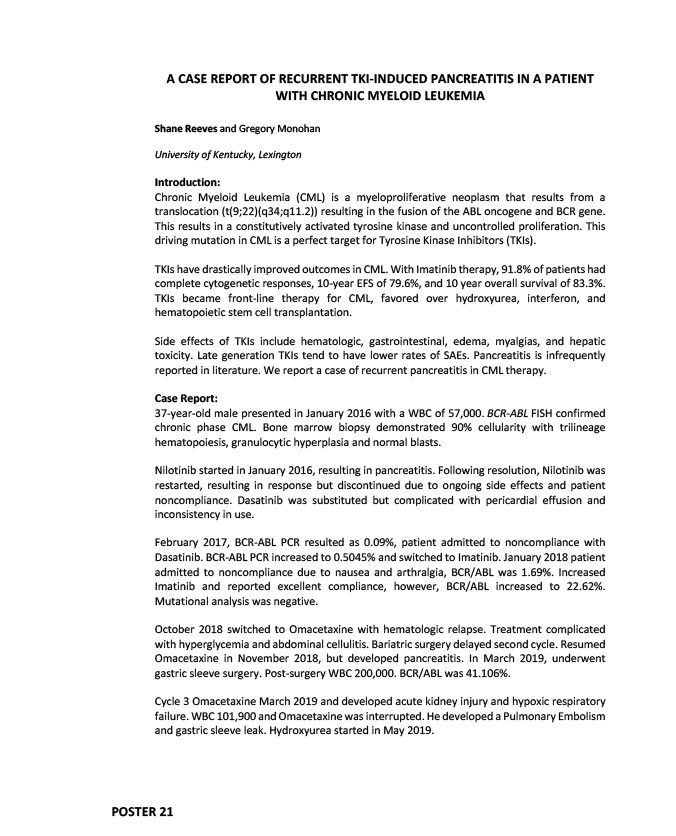
A CASE REPORT OF RECURRENT TKI-INDUCED PANCREATITIS IN A PATIENT
POSTER 21
WITH CHRONIC MYELOID LEUKEMIA
Shane Reeves and Gregory Monohan
University of Kentucky, Lexington
Introduction:
Chronic Myeloid Leukemia (CML) is a myeloproliferative neoplasm that results from a
translocation (t(9;22)(q34;q11.2)) resulting in the fusion of the ABL oncogene and BCR gene.
This results in a constitutively activated tyrosine kinase and uncontrolled proliferation. This
driving mutation in CML is a perfect target for Tyrosine Kinase Inhibitors (TKIs).
TKIs have drastically improved outcomes in CML. With Imatinib therapy, 91.8% of patients had
complete cytogenetic responses, 10-year EFS of 79.6%, and 10 year overall survival of 83.3%.
TKIs became front-line therapy for CML, favored over hydroxyurea, interferon, and
hematopoietic stem cell transplantation.
Side effects of TKIs include hematologic, gastrointestinal, edema, myalgias, and hepatic
toxicity. Late generation TKIs tend to have lower rates of SAEs. Pancreatitis is infrequently
reported in literature. We report a case of recurrent pancreatitis in CML therapy.
Case Report:
37-year-old male presented in January 2016 with a WBC of 57,000. BCR-ABL FISH confirmed
chronic phase CML. Bone marrow biopsy demonstrated 90% cellularity with trilineage
hematopoiesis, granulocytic hyperplasia and normal blasts.
Nilotinib started in January 2016, resulting in pancreatitis. Following resolution, Nilotinib was
restarted, resulting in response but discontinued due to ongoing side effects and patient
noncompliance. Dasatinib was substituted but complicated with pericardial effusion and
inconsistency in use.
February 2017, BCR-ABL PCR resulted as 0.09%, patient admitted to noncompliance with
Dasatinib. BCR-ABL PCR increased to 0.5045% and switched to Imatinib. January 2018 patient
admitted to noncompliance due to nausea and arthralgia, BCR/ABL was 1.69%. Increased
Imatinib and reported excellent compliance, however, BCR/ABL increased to 22.62%.
Mutational analysis was negative.
October 2018 switched to Omacetaxine with hematologic relapse. Treatment complicated
with hyperglycemia and abdominal cellulitis. Bariatric surgery delayed second cycle. Resumed
Omacetaxine in November 2018, but developed pancreatitis. In March 2019, underwent
gastric sleeve surgery. Post-surgery WBC 200,000. BCR/ABL was 41.106%.
Cycle 3 Omacetaxine March 2019 and developed acute kidney injury and hypoxic respiratory
failure. WBC 101,900 and Omacetaxine was interrupted. He developed a Pulmonary Embolism
and gastric sleeve leak. Hydroxyurea started in May 2019.